|
|
|
Sort Order |
|
|
|
Items / Page
|
|
|
|
|
|
|
| Srl | Item |
| 1 |
ID:
192991


|
|
|
|
|
| Summary/Abstract |
Visuals, including photographs and data visualizations, play a crucial role in the politics of EU border security, both as an internal governance tool (e.g. in surveillance) and as an external means of communication/representation (e.g. in photojournalism). Combining scholarship on photographic representations of migration with literature on surveillance technologies and data visualizations, we argue that these visuals interact to reproduce gendered and racialized meanings of migration and border security. Using a feminist postcolonial lens, we develop an intervisual framework for studying how processes of gendering and racialization render subjects, practices and spaces knowable at the intersection between these visuals. We apply this framework to a case study of Frontex’s Risk Analysis Reports (2010–2021) and demonstrate how it is applicable to other security institutions. The intervisual analysis reveals how the migrant Other and (white) European are visually reproduced through: 1) the (in)visibilization of bodies; 2) the ascription and denial of agency; and 3) the spatialization of borders as ‘frontier imaginings’ that oscillate between fortification and expansionism. The intersectional co-constitution of gender and race, we conclude, is central to the visual politics of Frontex, contributing to problematizing migrants and migration and legitimizing violent border practices.
|
|
|
|
|
|
|
|
|
|
|
|
|
|
|
|
| 2 |
ID:
153679
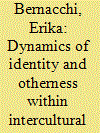

|
|
|
|
|
| Summary/Abstract |
Drawing on fieldwork carried out in 2012–2013, this article explores the dynamics of identity and otherness within selected women’s intercultural associations in Italy in the light of the following issue: how to acknowledge differences among women – based primarily on ‘race’, ethnicity, legal status/citizenship, class and age – while maintaining a common political project. This article focuses on the contexts, which facilitate the formation of such a project by promoting the contesting of rigid categorization of women on grounds of nationality or culture. It first focuses on what is referred to as ‘a starting point a bit displaced’, second on the desire to move beyond divisions on nationality grounds and third on the concept of hybridity as a bridge between women. At the same time, the article confronts those issues that might conceal power differentials among women and argues in favour of a notion of feminist intercultural reflexivity.
|
|
|
|
|
|
|
|
|
|
|
|
|
|
|
|
| 3 |
ID:
089231
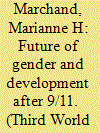

|
|
|
|
|
| Publication |
2009.
|
| Summary/Abstract |
The area of gender and development has been a site of critical contributions to the field of development studies and has been characterised as bridging practice, policy and theory. Since the policy of gender mainstreaming has been accepted, however, much of the originality and issues raised by the gender and development field have been marginalised and excluded from the development (policy) agenda. Some even argue that gender has been written out of the post- 9/11 development agenda thanks to the new global security regime. This article goes beyond these debates and suggests new ways of thinking about gender and development. Instead of arguing that it is 'dead', I argue that it is the site of innovative and critical thinking about development issues in a transformed and globalised world. The starting point for my argument is the insights provided by postcolonial feminism and transnationalism. While the former has contributed to feminist theorising through such concepts as representation, 'othering' and the silencing of Third World women's voices, the latter helps us understand new global realities resulting from migrations and the creation of transnational communities.
|
|
|
|
|
|
|
|
|
|
|
|
|
|
|
|
| 4 |
ID:
173903
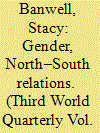

|
|
|
|
|
| Summary/Abstract |
In 2017, American President Donald Trump reinstated the ‘global gag rule’(GGR). This order bans new funding to nongovernmental organisations that provide abortion as a method of family planning, lobby to make abortion laws less restrictive, or provide information, referrals or counselling on abortions. In the same year the Trump administration defunded The United Nations Population Fund (UNFPA). The latter is reviewed against the backdrop of the conflict in Syria. These policies draw upon, and reproduce, normative representations of women as vulnerable, weak, passive and maternal. Focusing on women’s access to abortion following wartime rape, the meanings and implications of these policies are reviewed. Transnational and postcolonial feminist perspectives are used to unpack the core themes of this piece: gender, reproductive health care and foreign economic policy. Three main arguments are made: (1) US foreign policy on abortion under the Trump administration draws implicitly on conservative ideas about gender, sexuality and maternity; (2) denying female survivors of rape access to abortion – which is discriminatory and violates key international instruments – is a form of structural violence that amounts to torture; and (3) the GGR and the defunding of UNFPA reproduce structural inequalities between the Global North and the Global South.
|
|
|
|
|
|
|
|
|
|
|
|
|
|
|
|
| 5 |
ID:
134148
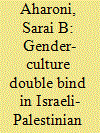

|
|
|
|
|
| Publication |
2014.
|
| Summary/Abstract |
This article investigates structural conditions for women's inclusion/exclusion in peace negotiations by focusing on the linkage between acts of gender stereotyping and cultural framing. Through a narrative analysis of semi-structured interviews with Israeli negotiators and administrators who participated in official negotiations during the Oslo peace process, I link two recent claims about how gender may affect negotiators' understandings of strategic exchange: the gendered devaluation effect and the gender-culture double bind hypothesis. Building upon postcolonial feminist critique, I argue that narratives about women and cultural difference (a) demonstrate and engage with Israeli essentialist and Orientalist discourses about Arab culture and masculinity; (b) manifest how ideas about strategic dialogue and negotiations are gendered; and (c) convey how policymakers and negotiators may use cultural claims to rationalize women's exclusion from diplomatic and strategic dialogue. Furthermore, the study implies that dominant framings of Israeli-Palestinian negotiations as a binary East-West encounter need to be replaced by a more nuanced conceptualization of cultural identity that captures contextual aspects of difference, including the existence of military power and masculine dominance.
|
|
|
|
|
|
|
|
|
|
|
|
|
|
|
|
| 6 |
ID:
126697
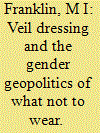

|
|
|
|
|
| Publication |
2013.
|
| Summary/Abstract |
This essay examines controversies in the European Union around legislation that bans women from dressing in a "visibly Muslim" way in public. It brings together two usually separate domains of inquiry to reconsider geopolitical, emotional, and intellectual crosscurrents of these ostensibly national controversies in parts of the EU. I argue that these two domains need addressing in tandem to generate new insights and move scholarly debates that have become polarized in turn. The first strand is critiques of the influence that popular culture, in particular reality television makeover shows, has on body image and global consumption practices. The second is postcolonial critiques of orientalist discourses around the agency of Muslim women and veil dressing practices. The aim is to unpack the underlying contradictions and blind-spots that characterize many of the arguments for and against these laws, used by critics of not only Burqa-Ban legislation but also Muslim women's veil dressing in a context in which western public imaginaries about what the veil really means are becoming increasingly polarized and punitive. This juxtaposition can provide a new theoretical and empirical point of departure for reflecting on the geopolitical and ethical implications of laws that aim to police women's bodies and ways of dressing in western liberal democracies; an hardening of attitude and political discourse that lies at the intersection of global shifts in post 9/11 popular imaginaries, national identity projects, and geopolitics.
|
|
|
|
|
|
|
|
|
|
|
|
|
|
|
|
|
|
|
|
|